The Gaelic American was an Irish nationalist newspaper published in the United States from 1903 to 1951 that was, along with the Irish Nation, owned by John Devoy. [1] [2] It was re-launched as an online news publication in 2021. [3]
The Gaelic American was an Irish nationalist newspaper published in the United States from 1903 to 1951 that was, along with the Irish Nation, owned by John Devoy. [1] [2] It was re-launched as an online news publication in 2021. [3]
| Part of a series on |
| Irish republicanism |
|---|
 |
A weekly publication of the organization that eventually came to be known as Sinn Féin, it was amongst the foremost Irish ethnic newspapers until the Great Depression when its readership declined. It had at various times as its editor George Freeman and John Devoy. [4] Between its establishment in 1903 and the early 1920s, the paper vehemently supported Irish republicanism and the use of physical force to achieve independence. In contrast to other Irish-American papers such as the Irish World, the Gaelic American supported the pro-Republic Clan na Gael organization and denounced the American wing of John Redmond's more moderate Irish Parliamentary Party, which advocated for Home Rule within the British Empire. [5] In its early years, the paper also collaborated extensively with the Indian nationalist organisations in Britain and the United States, most notably the India House in London and its sister organisations in New York City.
It reprinted articles from The Indian Sociologist and editor George Freeman was a close associate of Shyamji Krishna Varma. [6] The paper in 1910s also developed close cooperation with Taraknath Das and its facilities were used for printing Das's nationalist politician journal, Free Hindustan. [7]
In 1951 the paper was acquired by The Irish World and American Industrial Liberator. [8]
On July 4, 2021, The Gaelic American was re-launched as “An Online News Publication Dedicated to the Cause of Irish Unity, the Irish Language, and the Interests of Irish-America.” The website link is www.gaelicamerican.com
Conradh na Gaeilge is a social and cultural organisation which promotes the Irish language in Ireland and worldwide. The organisation was founded in 1893 with Douglas Hyde as its first president, when it emerged as the successor of several 19th century groups such as the Gaelic Union. The organisation was a spearhead of the Gaelic revival and of Gaeilgeoir activism.
The Freeman's Journal, which was published continuously in Dublin from 1763 to 1924, was in the nineteenth century Ireland's leading nationalist newspaper.

Arthur Joseph Griffith was an Irish writer, newspaper editor and politician who founded the political party Sinn Féin. He led the Irish delegation at the negotiations that produced the 1921 Anglo-Irish Treaty, and served as the president of Dáil Éireann from January 1922 until his death later in August.

Irish nationalism is a nationalist political movement which, in its broadest sense, asserts that the people of Ireland should govern Ireland as a sovereign state. Since the mid-19th century, Irish nationalism has largely taken the form of cultural nationalism based on the principles of national self-determination and popular sovereignty. Irish nationalists during the 18th, 19th, and 20th centuries such as the United Irishmen in the 1790s, Young Irelanders in the 1840s, the Fenian Brotherhood during the 1880s, Fianna Fáil in the 1920s, and Sinn Féin styled themselves in various ways after French left-wing radicalism and republicanism. Irish nationalism celebrates the culture of Ireland, especially the Irish language, literature, music, and sports. It grew more potent during the period in which all of Ireland was part of the United Kingdom, which led to most of the island gaining independence from the UK in 1922.
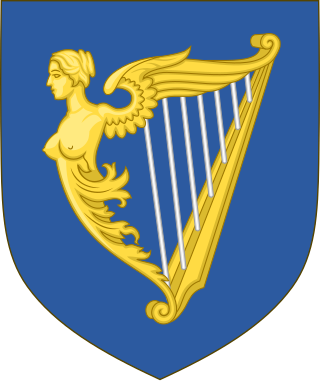
The Irish Parliamentary Party was formed in 1874 by Isaac Butt, the leader of the Nationalist Party, replacing the Home Rule League, as official parliamentary party for Irish nationalist Members of Parliament (MPs) elected to the House of Commons at Westminster within the United Kingdom of Great Britain and Ireland up until 1918. Its central objectives were legislative independence for Ireland and land reform. Its constitutional movement was instrumental in laying the groundwork for Irish self-government through three Irish Home Rule bills.
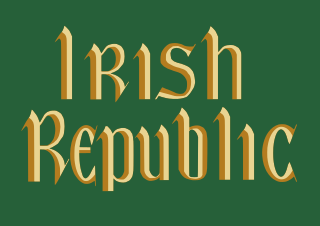
Irish republicanism is the political movement for the unity and independence of Ireland under a republic. Irish republicans view British rule in any part of Ireland as inherently illegitimate.
Regionalism is a political ideology that seeks to increase the political power, influence and self-determination of the people of one or more subnational regions. It focuses on the "development of a political or social system based on one or more" regions and/or the national, normative or economic interests of a specific region, group of regions or another subnational entity, gaining strength from or aiming to strengthen the "consciousness of and loyalty to a distinct region with a homogeneous population", similarly to nationalism. More specifically, "regionalism refers to three distinct elements: movements demanding territorial autonomy within unitary states; the organization of the central state on a regional basis for the delivery of its policies including regional development policies; political decentralization and regional autonomy".
Clan na Gael was an Irish republican organization in the United States in the late 19th and 20th centuries, successor to the Fenian Brotherhood and a sister organization to the Irish Republican Brotherhood.

Sinn Féin was a weekly Irish nationalist newspaper edited by the Dublin typesetter, journalist and political thinker Arthur Griffith. It was published by the Sinn Féin Printing & Publishing Company Ltd. (SFPP) between 1906 and 1914, and replaced an earlier newspaper called the United Irishman which was liquidated after a libel suit. The SFPP brought out the Sinn Féin Daily in 1909 but had to abandon it when it plunged the company into enormous debt. The Sinn Féin weekly and the SFPP both came to an end when they were suppressed by the British Government in 1914.
Abstentionism is standing for election to a deliberative assembly while refusing to take up any seats won or otherwise participate in the assembly's business. Abstentionism differs from an election boycott in that abstentionists participate in the election itself. Abstentionism has been used by Irish republican political movements in the United Kingdom and Ireland since the early 19th century. It was also used by Hungarian and Czech nationalists in the Austrian Imperial Council in the 1860s.
Sinn Féin is the name of an Irish political party founded in 1905 by Arthur Griffith. It subsequently became a focus for various forms of Irish nationalism, especially Irish republicanism. After the Easter Rising in 1916, it grew in membership, with a reorganisation at its Ard Fheis in 1917. Its split in 1922 in response to the Anglo-Irish Treaty which led to the Irish Civil War and saw the origins of Fianna Fáil and Fine Gael, the two parties which have since dominated Irish politics. Another split in the remaining Sinn Féin organisation in the early years of the Troubles in 1970 led to the Sinn Féin of today, which is a republican, left-wing nationalist and secular party.

Protestant Irish Nationalists are adherents of Protestantism in Ireland who also support Irish nationalism. Protestants have played a large role in the development of Irish nationalism since the eighteenth century, despite most Irish nationalists historically being from the Irish Catholic majority, as well as most Irish Protestants usually tending toward unionism in Ireland. Protestant nationalists have consistently been influential supporters and leaders of various movements for the political independence of Ireland from Great Britain. Historically, these movements ranged from supporting the legislative independence of the Parliament of the Kingdom of Ireland, to a form of home rule within the United Kingdom of Great Britain and Ireland, to complete independence in an Irish Republic and a United Ireland.
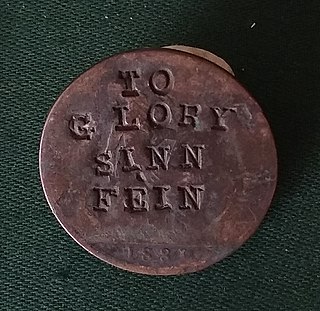
Sinn Féin and Sinn Féin Amháin are Irish-language phrases used as a political slogan by Irish nationalists in the late nineteenth and early twentieth century. While advocating Irish national self-reliance, its precise political meaning was undefined, variously interpreted as the aim of a separate Irish republic or that of a dual monarchy. Its earliest use was to describe individual political radicals unconnected with any party and espousing a more "advanced nationalism" than the Irish Home Rule movement represented by the Irish Parliamentary Party (IPP). In the 1890s "Sinn Féin, Sinn Féin amháin" was the slogan of the Gaelic League, which advocated the revival of the Irish language.
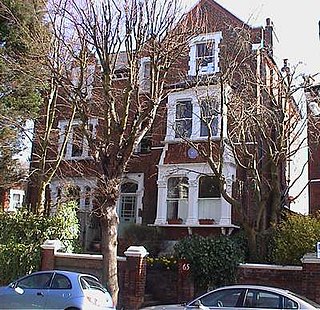
India House was a student residence that existed between 1905 and 1910 at Cromwell Avenue in Highgate, North London. With the patronage of lawyer Shyamji Krishna Varma, it was opened to promote nationalist views among Indian students in Britain. This institute used to grant scholarships to Indian youths for higher studies in England. The building rapidly became a hub for political activism, one of the most prominent for overseas revolutionary Indian nationalism. "India House" came to informally refer to the nationalist organisations that used the building at various times.
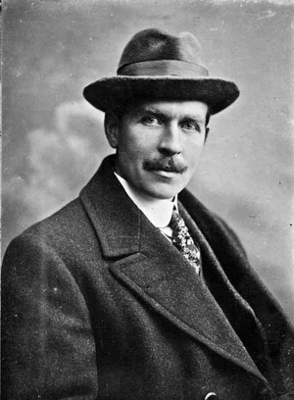
Diarmuid Lynch was a member of the Irish Republican Brotherhood and Sinn Féin member of the First Dáil.
Left-wing nationalism or leftist nationalism is a form of nationalism which is based upon national self-determination, popular sovereignty, national self-interest, and left-wing political positions such as social equality. Left-wing nationalism can also include anti-imperialism and national liberation movements. Left-wing nationalism often stands in contrast to right-wing politics and right-wing nationalism.
The Sinn Féin Printing & Publishing Company, Ltd. (1906–1914) was a Dublin-based enterprise founded by Arthur Griffith, chief propagandist of the nationalist Sinn Féin movement. It published, and for several years also printed, the influential weekly newspaper Sinn Féin. It also very briefly printed and published a daily paper. The company was close to bankruptcy in 1914 when it was closed down for sedition by the British authorities under the provisions of the Defence of the Realm Act.
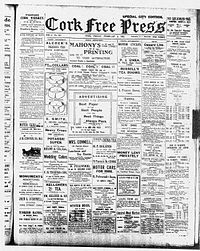
The Cork Free Press was a nationalist newspaper in Ireland, which circulated primarily in the Munster region surrounding its base in Cork, and was the newspaper of the dissident All-for-Ireland League party (1909–1918). Published daily from June 1910 until 1915, and weekly in 1915–16, it was the third of three newspapers founded and published within a decade by William O'Brien MP. It developed a unique approach to the national question and to the social issues of the day, with a pronounced conciliatory view to achieving Home Rule for the whole of Ireland. It displayed a favourable attitude towards the Sinn Féin movement. Its main rival newspapers were the Cork Examiner and the Freeman's Journal.
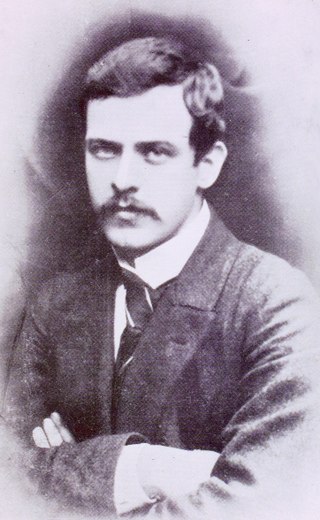
William Rooney, also known as Fear na Muintire, was an Irish nationalist, journalist, poet and Gaelic revivalist. Along with Arthur Griffith and Denis Devereux he founded the Celtic Literary Society, and with Griffith founded the first Cumann na nGaedheal.
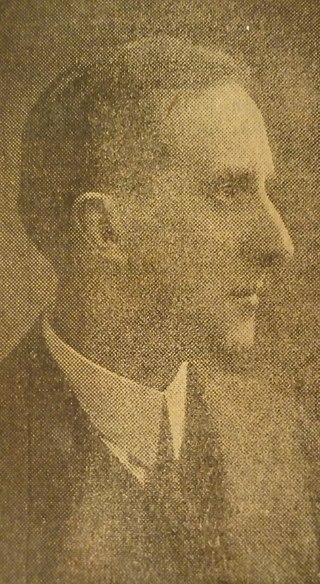
Harold Saunders Blackham was an English-born Irish author journalist, and editor. He was associated with 20th century Irish nationalism through movements such as Sinn Féin, Fianna Fáil and Clann na Poblachta.